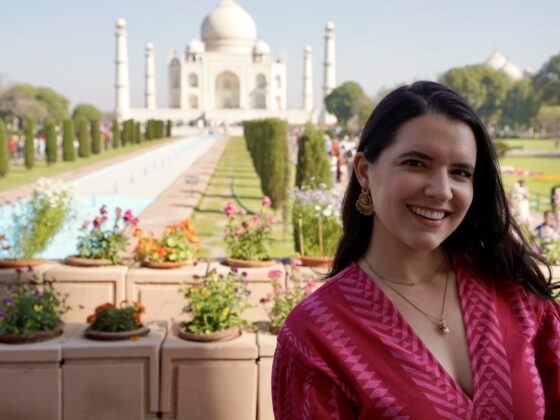Emily Rabbitt (Class of 2018 and second from the left in the photo above) recently returned from the Darden Worldwide Course to South Africa. The course focuses on public-private partnership cooperation in order to grow the economy. Prior to attending Darden, Emily worked in politics as a press secretary. During her time here, she has been involved with Net Impact and The Business & Public Policy clubs. Emily took the time to share some reflections from her experiences in South Africa. In her own words:
I signed up for this Darden Worldwide Course hoping to learn more about South Africa’s public-private partnerships as well as the larger African continent, which is expected to see its population increase to over 2 billion people by 2050. While I knew it would be a tremendous learning experience regardless, I was surprised to find that I was thinking more broadly about how to best help South Africa, and other nascent nations, realize all of its economic potential as opposed to the specific details about its partnerships.
Prior to the trip, I had always perceived South Africa to be one of the more developed nations in Africa. During my time there, I saw a very different side of the country, one that I might not have seen if I had traveled there on my own. With high unemployment, an inflated currency, a weak education system and an ousted corrupt leader, South Africa is very much still a developing country. Dynamics are further complicated by the fact that it adopted its current constitution in 1997, just over twenty years ago. My time in South Africa taught me that, while it is a breathtakingly beautiful nation with a complex history and rich culture, it is still defining who it wants to be.
Despite the challenges South Africa faces, the experience left me optimistic about the nation’s future. We witnessed several forces that are at work within country which help it forge its own unique path to economic prosperity. First, I am excited to see how South Africa’s new leader, President Ramaphosa, takes advantage of the opportunity in front of him to help the country move forward. We spoke with many people during the trip, from Uber drivers to the business leaders, who seem hopeful about his leadership and he has already made strides to reduce government corruption. He should take this time to put forth strong economic policies that will help the South African economy grow.
Furthermore, there are several other efforts occurring at the grassroots level that, when combined with the government’s possible new economic policies, can assist South Africa in strengthening its economy. We had the opportunity to meet with several entrepreneurs in the Khayelitsha township whose efforts are creating jobs and fulfilling a need in the market, whether it is encouraging healthy eating through The Spinach King’s spinach-based products or a woman figuring out how to install fiber so that the township can have internet access. We also visited a Fair Trade initiative in which several different South African vineyards participate. Proceeds from wine sales contribute to the Fairhills project, which provides various benefits to employees including schooling and daycare services for their children. Employees decide how the resources are used each year. These types of projects help to address the country’s social challenges and also encourage economic growth.
Finally, global business leaders can play a role in helping South Africa. A classmate raised an excellent point during one conversation that South African companies actually have a lot of power. If a foreign entity wants to invest in a South African business, the local company can include contingencies as part of the investment that accomplish many of the social goals needed to improve the country. For instance, one of our visits was to the retailer Massmart, which Walmart took a majority stake in 2010. As part of that investment, Massmart could have asked Walmart to dedicate some funds to invest in some social projects for its employees. Local companies need to better understand the role they can play in helping South Africa and business leaders should look for ways to do that.
I am looking forward to seeing how South Africa capitalizes on its current position and progresses in the future.





